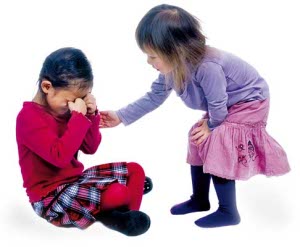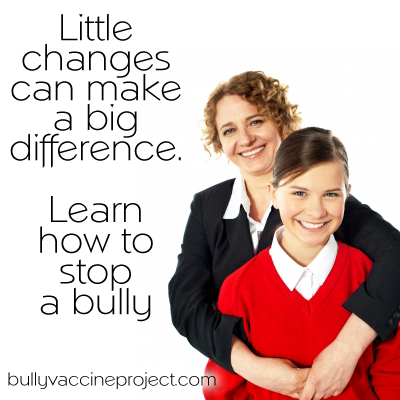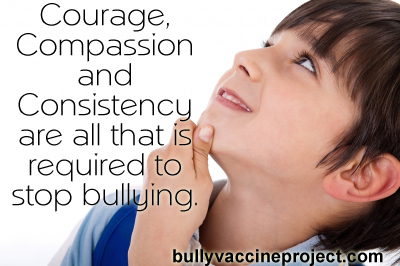- What to do if your child is a bully
- How to talk to your child’s school so they will actually listen and help
- Why Bullies Bully & How to Stop Them Using Science
It’s hard to hear that your child has been abusing another child. It is even harder to know how to get them to stop. Are they being falsely accused? How can you find out and how can you best support them either way?
This lesson is designed to guide you through the steps you need to take when your child is accused of bullying. It isn’t easy to learn your child has not been behaving properly and getting them to stop isn’t easy. But it can be done if you know the steps to take.
First, you need to find out exactly what they are being accused of. You need to find out whether or not the allegations are true or not. If they are true, you then need to develop a plan of action that will help your child learn more pro-social ways of dealing with their emotions and with conflict so that they will stop resorting to aggression as a way to get what they want.
This lesson is based on the operant conditioning techniques taught in the book The Bully Vaccine and includes, a video, along with detailed information on how to help your child if they are accused of bullying. This includes detailed information on how you, as their parent, can best support them if they are falsely accused and more importantly, how to get them stop if it turns out they really have been bullying other kids.
Video Lesson:
What is happening?
The first step in confronting a bullying allegation is to find out exactly what your child is being accused of. Did they call someone a name? Did they hit someone? Did they threaten someone? What exactly did they say? Where exactly did this happen? Who witnessed it? When did this happen?
Until you know exactly what the allegations are you cannot begin to deal with this problem. Bullying is a term that covers so many behaviors it is meaningless. As a result, it is very easy for a kid to refute a charge of bullying. However, the more specific the allegation is, the easier it is to find out whether it happened or not. Did you bully someone can easily be answered with a no. Did you shove someone in a locker or call someone a name (behaviors which there is probably evidence and or witnesses to verify) are much easier allegations to investigate and therefore much harder for a child to dismiss and refute if they are guilty.
Don’t allow your child to rationalize their behavior at this stage. You need to know specifically what they are accused of and did they actually do it. Keep in mind, if your child has been behaving inappropriately, they may lie to you about it.
What you want to know is what exactly your child is accused of and did they do it? Not, did they bully, but did they engage in an inappropriate behavior. I know when I am asked to mediate disputes between neighborhood kids, their first action is to justify their behavior – they didn’t do anything wrong, because they felt justified. That’s not the question you need to ask. The first and most important question is did they behave inappropriately. We will get to the question of WHY they behaved that way later.
To summarize, your first task is to properly identify the specific behavior that your child is accused of engaging in and to find out whether or not they did that. If your child tries to rationalize their behavior by saying the other person did something wrong first – that is an indication that they did indeed do what they are being accused of. If they flat our refute it and say it didn’t happen, trust them but verify.
Why is this happening
Now that you know what happened, the next question is why did it happen? There are few basic possibilities that may include the following (be aware this is not an exhaustive list):
1) Your child is defending themselves
2) They are frustrated and behaving poorly as a result
3) They are stressed and behaving poorly as a result
4) They are insecure and are behaving poorly as a result.
5) They have a mental health issue and can’t control their behavior
Self-Defense:
If your child is defending themselves, you need to teach them better ways to defend themselves that don’t involve them behaving aggressively. Again, knowing what exactly is happening will help you develop effective strategies. If your child claims to be the victim, assure them you will help them and review the material on how to help your child overcome a bully and how to talk to your child’s school about bullying together.
If your child truly is a victim of abuse from other kids it will become obvious as you implement those strategies. If, on the other hand, they start behaving worse, you will know that your child really does have a problem they need more help with.
There are several reasons why you need to explicitly teach your child more pro-social ways of dealing with conflicts. 1st – it will help them learn more pro-social ways of dealing with conflict. It will also help you and their teachers better see the abuse being directed towards them so that it can be dealt with.
Naked Aggression:
If, on the other hand, you find out that your child is the aggressor, you will want to delve more deeply into this. Why do they want to control another child? Are they under stress? Are they insecure? Are they happy in school? If your child is behaving aggressively, it may be a sign that they need additional help. Once you know what they are dealing with emotionally, you can help them learn to achieve their objectives in a pro-social way.
Remember, kids who learn to use aggression to solve their problems don’t give up this strategy when they reach adulthood. This is a lifetime strategy that is being established. It’s up to you as the parent to help them learn how to channel their energy and aggression in a way that is good as opposed to in a way that harms themselves and others.
What you can do as the parent?
Assuming a child is in fact bullying others, parents are limited in what they can do to help their child choose better behaviors in the future. Bullying and aggressive behavior towards their classmates is usually done when adults aren’t around to intervene. Bullies engage in these aggressive behaviors because they work.
In order to get a child to stop using aggressive behavior, you have to eliminate the rewards (which are outside of your control as the parent because they are coming from their friends and classmates) and you have to increase the cost of the behavior (which is something you as a parent can do).
As a parent, you should also consider the possibility that your child may need additional help or counseling of some sort to help them overcome the emotional issues that may be driving their behavior.
It’s Not OK
In order to start addressing a behavior problem, you need to make it clear to your child that whatever it is they did isn’t ok. You must state this clearly and calmly. In fact, the calmer you are the better. Don’t get mad at them or speak to them in anger about this. Negative reinforcement is still reinforcement. A calm matter of fact tone will be more effective precisely because it is devoid of emotion.
Let them know that if they are unfairly accused, you will back them up and help them prove their innocence, but that you won’t tolerate them behaving this way anymore and that you won’t tolerate retaliatory behavior either. Again, this message must be delivered in a calm, matter of fact way.
You then need to teach them how to get help with the problem they are dealing with so that they don’t have to retaliate with aggressive behavior. They need to know that as long as they engage in aggressive behavior their problem won’t be solved. In order to solve their problem they have to stop retaliating so that everyone can see that the other person is at fault.
Blow Outs:
If it turns out that your child is the aggressor, it will become clear very quickly because they won’t be able to stop and they will end up retaliating.
Victims of bullying can very easily change their behavior. Bullies have a much harder time. The reason for this is because bullying is an adaptive behavior and it is often an addiction. Bullies can’t just stop. They will cycle through a blowout first.
I write about this more in my book, but basically, a blowout or extinction burst is what happens when a habitual behavior is extinguished. The reward for the behavior is removed, the cost of the behavior is increased and the bully responds by becoming more aggressive. This may look like retaliation behavior and it basically is. But what is actually happening is that the bully is trying to get the victim to stop reporting so that the bully can continue behaving the way they were without consequence. It is important to realize that the bully can’t really help themselves. This is an instinctive response that all animals engage in when the reward for a habitual behavior is removed.
To summarize: if your child is truly a victim, they will do their best to implement your training and with your support, will be able to solve their problem effectively. If they are a bully, they will probably escalate their behavior towards their victim and enter an extinction burst/blow out.
Consequences
While you can hope your child will behave better after one lesson, that isn’t a realistic expectation, especially not if they have been behaving poorly for a while. It is more likely that they will retaliate as they enter an extinction burst and you need to be prepared for that by providing them with consequences if they continue to behave inappropriately.
The sequence of your actions as the parent is to:
• Give them a warning (this behavior isn’t ok) and teach them how to behavior properly.
• Give them a chance to do better.
• If they don’t, they get consequences.
• They continue to get consequences until they cycle through the blow out and start behaving properly.
What are appropriate consequences?
What the consequences are depends on what the behavior is. If they are calling people names, you might just eliminate their electronic privileges (not just the tv – but all electronic media through which they can access entertainment).
If, on the other hand, they are engaging in criminal behavior (like threatening someone, stalking someone or physically battering someone), then they will need more severe consequences, such as the elimination of all extracurricular activities until their behavior improves. Basically, you will ground them. This may seem severe, but remember, many of the behaviors considered bullying are criminal behavior and loosing extracurricular activities is much better than ending up in jail. Bullies are 60% more likely to end up in the criminal justice system than other kids. You need to make it clear that criminal behavior will not be tolerated. You are helping them when you teach them this lesson compassionately.
The other reason to eliminate all extracurricular activities if your child is engaged in criminal level bullying is because it will prevent them from having access to their victims after school and in other social settings. When you consider bullying as addictive behavior, removing the temptation to bully but eliminating your child’s opportunities to bully but restricting their behavior for a short time may be what is needed to break the cycle of bullying addiction.
Note: Consequences are not punishments. Consequences such as the elimination of privileges are not done to harm your child. They are done to constrain your child to keep them from hurting others until their behavior improves. This contrasts with a punishment that seeks to hurt your child in retaliation for hurting someone else. Punishment is counterproductive in many ways. It teaches your child that retaliation is a valid problem solving approach and it often encourages them to misbehave more. To get them to stop, you eliminate rewards. That isn’t the same thing as punishing them.
Inconvenience of parenting
Most parents aren’t willing to eliminate all of their child’s extracurricular activities and privileges. The reason is because it isn’t just inconvenient for your child. It is inconvenient to you. Whenever you restrict electronic media, you have to be more present as a parent for your child. You have to monitor them more closely. You have to rearrange your schedule to be home with them instead of out and about doing your errands. It’s inconvenient and difficult on both parent and child.
Just remember, if your child is a bully, they have to cycle through an extinction burst. That is the only way to get them to stop. Your job as a parent is to make sure they complete the extinction process quickly. If you give in before the extinction burst is complete, they will revert back to their bad behavior but they will be more aggressive about it. It is imperative that you make your child complete the extinction process once it is started. That means you need to remain firm.
Your child will try to pressure you to give them back their privileges by whining and escalating their behavior towards you (an extinction burst itself) as they try to convince you to go back to the status quo. Don’t give in. You are the parent. You owe it to them and to society to help them learn how to behave better and the only way to unlearn bad behavior is to cycle through an extinction burst. Help them by remaining strong. It is the compassionate thing to do. Really it is.
To recap: Make sure your expectations for their behavior are clear. Remain calm and matter of fact in all discussions about this. If they retaliate, their will be consequences. How severe depends on whether the behavior is criminal or not. If they retaliate, they get the consequences. Their privileges are not to be restored until they cycle through the blow out and start behaving better.
Reporting
How will you know when they have completed their extinction burst? By getting daily reports on their behavior. Extinction bursts take time to play out and if your child is bullying, you have to expect them to get worse before they get better.
It is imperative that you get a daily report on whether they transgressed or not so that you can respond appropriately at home in the evening. To work, all inappropriate behavior has to receive a consequence. If reports are delayed a few days your child will have an opportunity to misbehave without receiving a consequence. This will set up what is known as a variable reinforcement schedule which will actually strengthen and escalate the behavior you are trying to eliminate. It is critical that responses during an extinction process are consistent, which means you need to know every day how your child behaved so that they receive a consequence immediately when they behave poorly and praise and the restoration of a privilege when they behave well.
To get these daily reports will take an effort on your part as the parent. Don’t expect the school to provide these reports to you. You need to be proactive and speak to the teacher daily until this process is complete. Is it a hassle? Yes. Do it anyway.
If your child’s teacher isn’t helpful, ask the victim’s parent to help by speaking to them daily. It is much harder for a child to get away with bad behavior when parents share information. Again, this knowledge will help your child cycle through the extinction burst quicker than if you only check up on them every few days. Plus, the victim’s parent is likely to be appreciative to know you are taking your child’s behavior seriously enough to give your child consequences until this problem is resolved. Be sure to let them know of the steps you are taking and keep them informed so that they can share that information with their child. This will help encourage their child to report more, which is what you need if you are to help your child stop.
Summary:
If your child is accused of bullying there is a problem you need to address. Even if it turns out they are the victim, they still need to learn more effective pro-social ways of dealing with conflict and problems such as how to report the other person’s bad behavior in a way that actually works. If your child is the bully then they need to unlearn the bad behavior patterns and learn better ways to cope with life’s difficulties.
You do this by properly identifying the specific behaviors that are unacceptable and making it clear that retaliatory behavior is also unacceptable and that there are other more effective ways to resolve these sorts of conflicts. You as the parent need to make sure you provide the training your child needs to learn those other skills.
If your child is bullying, it will become apparently quickly as your child cycles through an extinction burst. To help your child cycle through the extinction burst as quickly as possible, you need to make sure that your child receives consistent consequences every time they behave badly and these consequences need to be the removal of privilege, not punishment.
To provide consistent consequences, you have to have consistent reporting and you will have to be proactive with the school and/or with the victim’s parents to get that information.
For further learning:
If you suspect your child is the victim – checkout how to talk to your child’s school about bullying. This information will help you navigate the school system to help your child and it will help you teach your child more effective and pro-social ways to deal with conflict.
Get a copy of The Bully Vaccine if you don’t already have it, or check out the Bully Vaccine Home Vaccination Toolkit which includes a free copy of the book.
Advice from Olweus – http://www.education.com/magazine/article/what-to-do-if-your-child-is-a-bully/






Pingback: What do you tell a child that’s being bullied? What do you tell a child that is a bully? – The Bully Vaccine Project
Pingback: Should you have to pay a fine if your child is a bully? – The Bully Vaccine Project